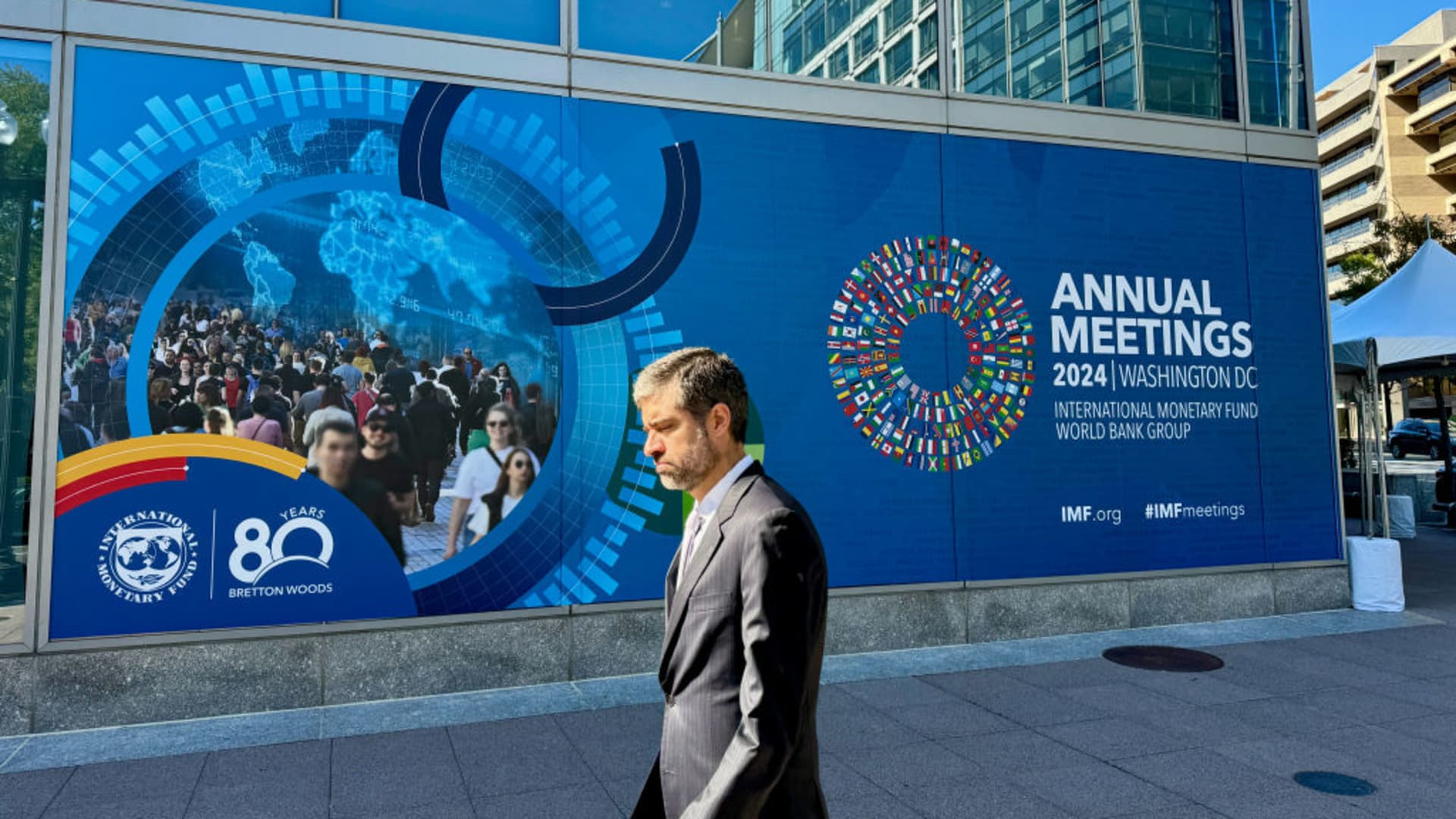Much of the world has managed to successfully lower inflation and engineer an economic soft landing, avoiding recession, but faces rising geopolitical risks and weaker long-term growth prospects, according to the International Monetary Fund.
Global headline inflation will fall to 3.5% on an annual basis by the end of 2025, from an average 5.8% in 2024, the agency said in its World Economic Outlook released on Tuesday. Inflation peaked at a year-over-year rate of 9.4% in the third quarter of 2022. The yearend 2025 rate is slightly below the average annual rise in prices in the two decades before the Covid-19 pandemic.
“The global battle against inflation is almost won,” the IMF report trumpeted, even as it called for “a policy triple pivot” to address interest rates, government spending and reforms and investment to boost productivity.
“Despite the good news on inflation, downside risks are increasing and now dominate the outlook,” said IMF chief economist Pierre-Olivier Gourinchas. Now that inflation is headed in the right direction, global policymarkers face a new challenge stemming from the rate of growth in the world economy, the IMF warned.
The fund kept its global growth estimate at 3.2% for 2024 and 2025 — which it called “stable yet underwhelming.” The United States is now forecast to see faster growth, and strong expansions are also likely in emerging Asian economies as a result of robust artificial intelligence-related investments. But the IMF lowered its outlook for other advanced economies — notably the largest European nations — as well as several emerging markets, blaming intensifying global conflicts and ensuing risk to commodity prices.
Vigilance needed in final stretch of disinflation
The Washington-based IMF, with 190 member countries, said in its overview that responsive monetary policy was key to bringing down inflation while labor market conditions normalized and supply shocks unwound, all of which helped avoid a global recession.
Central banks will need to remain vigilant in fully bringing down inflation, the report warned. It added that services inflation still remains nearly double pre-pandemic levels as wages in certain countries continue catching up to an increase in the cost of living, leading several emerging market economies such as Brazil and Mexico to see an uptick in inflationary pressures.
“While inflation expectations have remained well anchored this time around, it may be harder next time, as workers and firms will be more vigilant in protecting their standards of living and profits going forward,” the report stated.
Lower-income countries, where food and energy costs account for a greater share of household expenses, are also more sensitive to spikes in commodity prices that could lead to higher inflation. Poorer countries are already under greater stress from sovereign debt repayments, which could further limit funding for public programs.
Market volatility among key downside risks
Heightened financial volatility is another threat to global growth, the IMF report said. Sudden market sell-offs, such as occurred in early August, were cited by the IMF as a key risk that clouds the economic outlook. Although markets have steadied since the brief August’s slump, fueled by an unwinding of the yen carry trade and weaker-than-expected U.S. labor market data, worries remain, according to the fund.
“The return of financial market volatility over the summer has stirred old fears about hidden vulnerabilities. This has heightened anxiety over the appropriate monetary policy stance,” the report said.
Further challenges to global financial markets could come in the final stretch of the fight against inflation. Market turbulence and contagion is a key risk if underlying inflation remains stubborn — a key risk to low-income countries that are already under stress from high sovereign debt and currency market volatility.
Other downside risks include geopolitical concerns, notably the Middle East conflict and potential spikes in commodity prices. A potentially deeper Chinese property market contraction, interest rates remaining too high for too long and rising protectionism in global trade are other threats to prosperity, the IMF said.
The outlook is murkier longer term. The IMF forecasts global growth will rise 3.1% annually at the end of the 2020s, the lowest level in decades. While China’s weaker outlook has weighed on medium-term projections, but so does a deteriorating outlook in Latin America and Europe. Structural headwinds such as low productivity and aging populations are also limiting growth prospects.
“Projected slowdowns in the largest emerging market and developing economies imply a longer path to close the income gaps between poor and rich countries. Having growth stuck in low gear could also further exacerbate income inequality within economies,” the IMF warned.

 Blog Post6 days ago
Blog Post6 days ago
 Economics1 week ago
Economics1 week ago
 Accounting1 week ago
Accounting1 week ago
 Economics1 week ago
Economics1 week ago
 Personal Finance1 week ago
Personal Finance1 week ago
 Personal Finance1 week ago
Personal Finance1 week ago
 Accounting1 week ago
Accounting1 week ago
 Finance1 week ago
Finance1 week ago





















